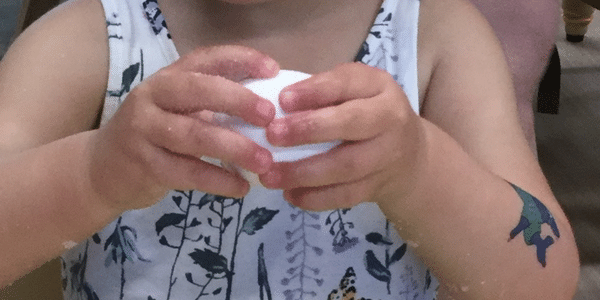Intentional Planning for Toddlers

*NEW* Activities for Toddlers
Every week we plan activities for our toddlers, and often I am asked if I have any innovative ideas. Everyone likes new ideas!
Here is a planning strategy that you can use with any activity to extend it and deepen the learning....
Break it down.
Now really, how is that helpful? Let me give you an example.
The toddlers I am currently working with are always turning everything that is around them into a birthday cake. Nesting cups, blocks, rocks, play food, you name it, it's a birthday cake.
Using the children’s interests, my assistant and I decided it would be fun to bake cupcakes with them. As we talked it through, we reflected on how we could break it down and build up to the final event. After all, the most engaging learning happens through the process!
Monday, we made homemade whipped cream and used food coloring to add a hint of color. During this activity, we introduced several new vocabulary words as we talked about what was happening when the colors were mixed together.
Tuesday, we practiced cracking eggs. This was a HUGE hit! I gave each child a small bowl and an egg. I demonstrated, let them try, helped them clean it up when it didn't go well and then cooked each individual egg in the microwave. We then had scrambled eggs for snack. They LOVED it!
Wednesday, we had trail mix and added chocolate chips (which would later be the topping to the cupcakes). We talked about sweet and salty and did a little bit of sorting as we ate. What a simple way to use our early math skills!
Thursday, it all came together. The children got to crack eggs again (which continues to be the most requested activity) and we baked cupcakes. They put a little bit of the whipped cream on top with a few chocolate chips and we spent the time recalling all the events of the week that led to that day. Not only did we practice our fine motor skills again, but we also used our memory and sequencing skills to order the activities we did each day.
It was so powerful! Thinking of activities in this way can be challenging, but once you realize that one activity can be broken down into 3 or 4 other activities it will not only slow you down but will also give you a whole new set of activities to choose from!
Give it a try and let me know what you think! No step is too small. Revisiting activities and extending them builds stronger brain connections and gives children confidence in their abilities as well as more opportunities to practice their skills.
Remember that in the eyes of infants and toddlers, even the smallest experiences are incredibly powerful!
*BONUS ACTIVITIES*
Extension activities that we thought of based on our week of baking exploration
1) Encouraging mixing colors of paint at the easel and revisiting the vocabulary you previously introduced.
2) Add sorting baskets to your math/manipulatives area to continue encouraging the sorting that happened during the trail mix snack.
3) Add plastic eggs and metal bowls to the dramatic play area to continue encouraging the use of the fine motor skills it takes to crack an egg.
The possibilities are truly endless! What else are you able to think of that could extend these ideas?
 Julie Sizemore is the creator of RESPECT Care Teaching. A wife and mother of two children, she has been in the field of early childhood education since 1999 in many different capacities from home-based childcare, to center based child care, after school programs, home visiting, and a community liaison. Currently, she works full time as a lab instructor at the Phyllis Fratzke Early Childhood Learning Laboratory (ECLL) on campus at Grand Rapids Community College, working in the 0-3 Early Head Start Classroom. In the evening and on weekends, she provides in person and online training focused on infants and toddlers for the early childhood community. Julie is a fierce advocate for treating infants and toddlers with respect and educating people on developmentally appropriate practices.
Julie Sizemore is the creator of RESPECT Care Teaching. A wife and mother of two children, she has been in the field of early childhood education since 1999 in many different capacities from home-based childcare, to center based child care, after school programs, home visiting, and a community liaison. Currently, she works full time as a lab instructor at the Phyllis Fratzke Early Childhood Learning Laboratory (ECLL) on campus at Grand Rapids Community College, working in the 0-3 Early Head Start Classroom. In the evening and on weekends, she provides in person and online training focused on infants and toddlers for the early childhood community. Julie is a fierce advocate for treating infants and toddlers with respect and educating people on developmentally appropriate practices.
